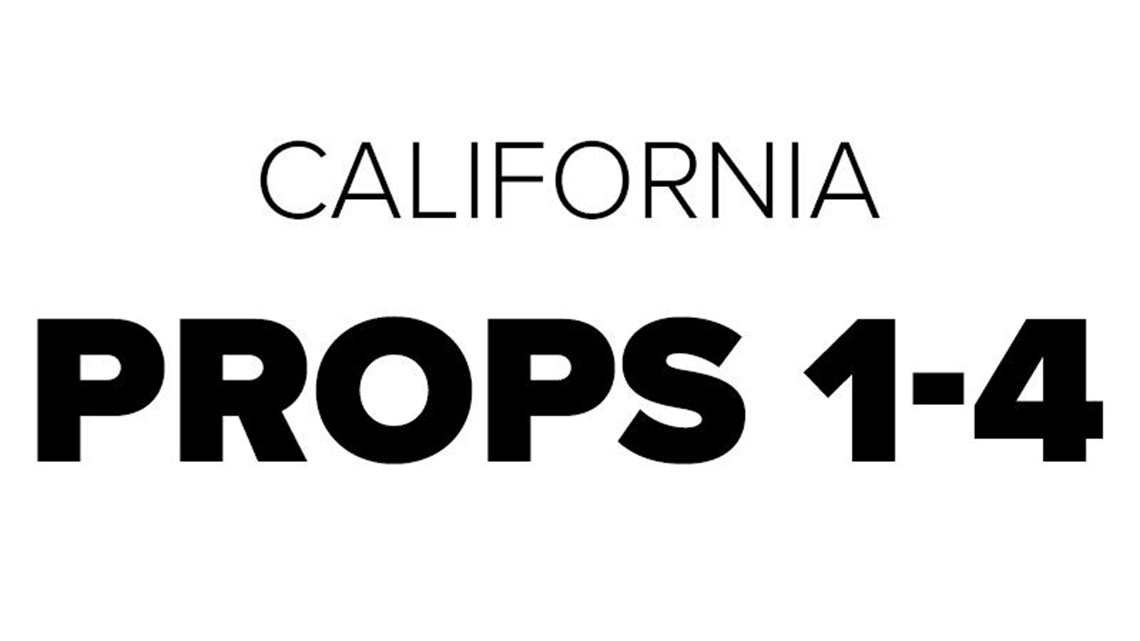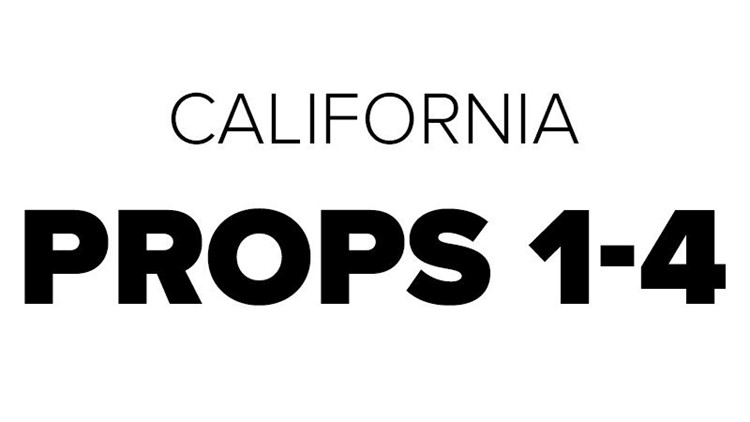LAST UPDATED: Wednesday, Nov 7 | 12:45 p.m.
PROPOSITION 1 - HOUSING ASSISTANCE BONDS VETS, AFFORDABLE HOUSING
Proposition 1, a $4 billion bond measure to fund housing programs benefiting low-income residents and veterans, seemed likely to pass. With 100 percent of precincts reporting, it has 54 percent of the vote. The measure would earmark $1.5 billion for multi-family housing for low-income Californians, along with $1 billion to help veterans purchase homes or farms. It would also provide $450 million for "infill" and transit-oriented projects, $300 million for farmworker housing and $300 million for manufactured and mobile homes. According to the state, the bond issue would cost roughly $170 million annually for 35 years.
PROPOSITION 2 - MENTAL ILLNESS HOUSING BONDS CONCERNS THE HOMELESS
AP - California voters have approved $2 billion in bond funding to house homeless people with mental illness.
Returns on Wednesday morning show Proposition 2 with 61 percent of the vote with 100 percent of precincts reporting.
Lawmakers approved the bonds in 2016 with plans to repay them using funds from a tax on millionaires that voters approved in 2004. But the funds became tied up in court because of a lawsuit that argues voters approved the tax to fund mental health services, not housing.
Lawmakers and the governor decided to resolve the legal dispute by taking the issue to voters.
Another housing bond measure also appears to be winning. Preliminary returns show Proposition 1 leading with 54 percent of the vote. It would fund housing for the poor and veterans.
Proposition 3 - Water and Environment Bonds
LOS ANGELES (AP) — Californians were leaning against borrowing $9 billion for water projects Tuesday in a state where water scarcity often pits city dwellers, farmers, anglers and environmentalists against one another.
About 52 percent of voters opposed Proposition 3 with about 100 percent votes counted.
The bond measure devoted money to storage and dam repairs, watershed and fisheries improvements, and habitat protection and restoration.
Much of the $8.9 billion was earmarked for conservancies and state parks to restore and protect watersheds, and to nonprofits and local agencies for river parkways.
There also was money for improvements to meet safe drinking water standards.
The measure was backed by agricultural and water associations and groups devoted to conserving wetlands, fish and wildlife. Together, they had contributed more than $5 million to the campaign by mid-October.
Sierra Club California and the League of Women Voters of California were among opponents who said the measure benefited special interests while siphoning money from other programs. No significant money was spent by the opposition.
Proposition 3 was the largest water bond proposal since California's nonpartisan legislative analyst began keeping track in 1970.
Less than $500 million was tagged for surface water storage and dam repairs, including $200 million to help repair Oroville Dam in Butte County, where damaged spillways last year caused the precautionary evacuation of nearly 200,000 people living downstream.
With the payback cost estimated at $430 million a year for 40 years, the legislative analyst put the total cost of the measure to state taxpayers at $17.3 billion, or about double the underlying benefit.
Local governments were projected to save about $200 million annually for water-related projects, with some matching funds required and preference given to disadvantaged communities.
Voters previously approved nearly $35 billion in bonds since 1970 for water and environmental projects, including $4 billion from a ballot measure passed in June. About a third of all funding remains unspent.
PROPOSITION 4 - CHILDREN'S HOSPITAL BONDS CONSTRUCTION, RENOVATION
Proposition 4 picked up more than enough support for a $1.5 billion bond measure to fund construction, expansion and equipment for children's hospitals across the state, including Children's Hospital Los Angeles, Children's Hospital of Orange County, Miller Children's Hospital in Long Beach and Rady Children's Hospital in San Diego. Funds would also be provided to children's hospitals at University of California medical campuses, including UCLA, UC Irvine and UC San Diego. The repayment cost is estimated at $80 million annually for 35 years. With 100 percent of precincts reporting, proposition 4 has 61 percent of the vote.
California Props 1 - 4 Explained:
To view video on YouTube, click here.
SAN DIEGO (NEWS 8) - The November election is closing in, and as usual, there are plenty of propositions on the ballot.
News 8 takes a look at each measure, starting with California Props 1-4 on bonds, which includes housing, homeless, water projects and children's hospitals.
Below is a list of what each proposition authorizes, according to California's Official Voter Information Guide.
- Prop 1: Authorizes Bonds to Fund Specified Housing Assistance Programs.
- Prop 2: Authorizes Bonds to Fund Existing Housing Program for Individuals with Mental Illness
- Prop 3: Authorizes Bonds to Fund Projects for Water Supply and Quality, Watershed, Fish, Wildlife, Water Conveyance, and Groundwater Sustainability and Storage
- Prop 4: Authorizes Bonds Funding Construction at Hospitals Providing Children’s Health Care
If Props 1-4 all pass, California taxpayers would pay more than $32 billion over the next four decades to finance $16 billion of spending right now.
It's up to you to decide if the spending is worth it.





